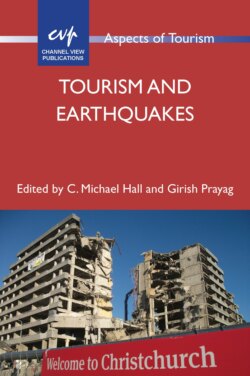Читать книгу Tourism and Earthquakes - Группа авторов - Страница 6
На сайте Литреса книга снята с продажи.
ОглавлениеTables, Figures, Plates
Tables
1.1 Top 10 costliest world earthquakes and tsunamis by insured losses, 1980–2001
1.2 Major focus of chapters in relation to stages of disaster management cycle
2.1 Socioeconomic characteristics of respondents
2.2 Provisional timeframes of a fault earthquake in the Etna area
2.3 Level of threat due to earthquake
2.4 Earthquake risk: Sources of information
2.5 Community preparedness initiatives
2.6 Respondent perception of preparedness with respect to a seismic event
2.7 Perceptions of community belonging
2.8 Preparation acts for business resilience
4.1 Number of foreign visitors to Indonesia and Bali, 1969–2018
4.2 Number of rooms in classified hotels, non-classified hotels and other accommodation in the southern coastal region of Bali
7.1 Kumamoto Earthquake (earthquakes recorded stronger than M 5.0) between 14 April and 31 August 2016
7.2 Earthquake frequency by magnitudes (14 April 2016–30 June 2017)
8.1 Core business of respondents
8.2 The recovery period of business entities after the Jogjakarta Earthquake
10.1 Ghost tourism cities
10.2 Research participants: Local community members
10.3 Research participants: Tourists
Figures
1.1 System dimensions of tourism in earthquake affected destinations
2.1 Fault earthquake risk: Perception of preparedness
2.2 Discussion on earthquake preparedness
2.3 Opinion regarding consequences of fault earthquake
2.4 Opinion regarding consequences of fault earthquake
7.1 Kumamoto Earthquake epicentres and surrounding area
8.1 The most widely perceived business difficulties after the earthquake
Plates
4.1 Hotel displaying tsunami evacuation signage at Sanur Beach, 2017
4.2 Temporary Tsunami Evacuation Centre in Serangan Village
7.1 Aso Farmland accommodation poster at the entrance to Aso Farmland complex
